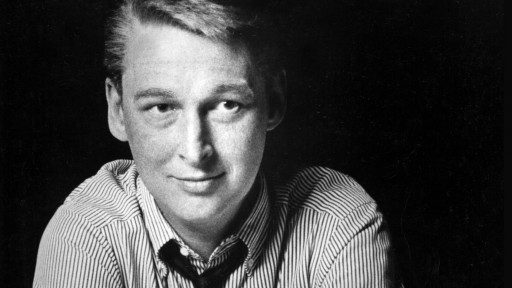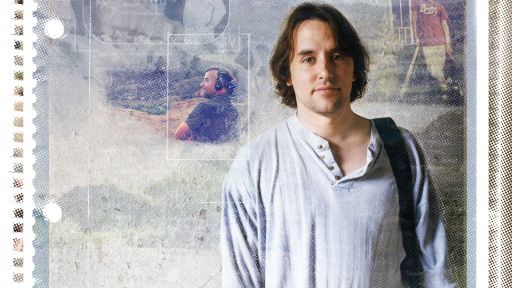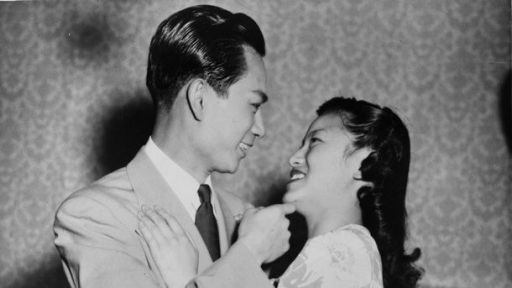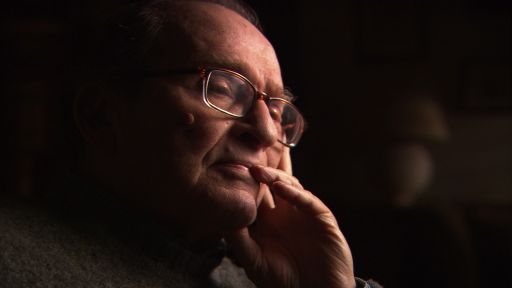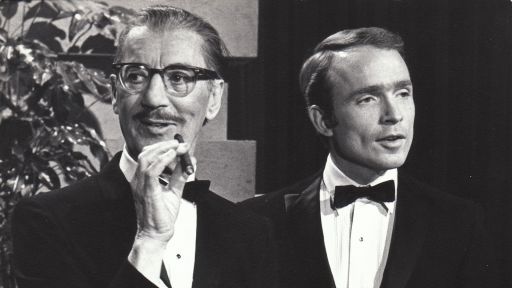TRANSCRIPT
- Well, at first, women in comedy were usually, the comedy was usually led by a man and she was the wife or she was the girlfriend or she was something like that.
And actually my first series was in 1951, '50, '51, and I produced it, and that was very unusual for a woman to be a producer and for a woman to be the comedy, and we had a woman director.
But I didn't know I was breaking any ground.
It wasn't a thing about, 'By George, we're gonna get women in there.'
I had no, I just took people I liked and people who worked at the studio.
Then later, way later when the women's movement came along, I thought, 'Well, what else is new?'
But I never, ever felt any discrimination from the guys on the set or the men.
Betty Turbeville was our director, I don't think she did either.
- [Interviewer] But was there sort of a sort of tradition that, you're sort of the exception, but that women couldn't be sort of both feminine and funny?
- Oh, I think that a big misconception was that you can't be funny and beautiful and smart.
You've got to pick one, but you can't have the whole package.
And Lucy kind of broke that mold, too.
She was beautiful, she was smart, and she was funny.
And then Carol came along and she was beautiful and she was smart and she was funny.
But I used to love Carol's singing.
It was her singing that knocked me out.
She did a, my favorite song is 'Here's That Rainy Day.'
And she could put me away with that anytime she did it.
And she always ended it, the end of the song is 'Funny, but here's that rainy day,' and she would just end it with 'funny' and then let it hang there.
Well, I can get goosebumps just talking about it.
- [Interviewer] Can you talk more about her face?
I mean, I just feel like, it seemed like it was made of rubber sometimes.
- Carol Burnett had probably the most expressive face in the world, but she was never worried about what she looked like.
Carol Burnett's face was, well, sometimes you suspected it was made of rubber because she could do anything with it.
But she never cared about how she looked.
It wasn't always, 'Well, I don't want to do that because I might not look wonderful.'
She would do terrible things with that face.
And what I found such a delight, as long as we're talking about favorite things, when she and Julie Andrews got together, they just sparked each other to the point that here's this beautiful Julie Andrews, this lovely, lovely lady, and you saw the humorous side of Julie and the two of them, they just, well, they just struck fire together.
I could watch them forever.
- [Interviewer] Was comedy itself changing at that time too, from sort of, it had been more vaudeville and it was becoming something else?
- I think that was a big transition period at that time for comedy.
Prior to that, women, again, had been the wives or the girlfriends or that.
And even prior to that, they would do a standup routine with like Burns and Allen or various combos like that.
So there was a show called 'My Favorite Husband,' and it did a half-hour storyline.
And that's when the situation comedy started.
And mine was 'Life With Elizabeth.'
And we had done sketches on a variety show, an hour.
I was on five-and-a-half hours a day during the week, six days a week, and that wasn't enough, so we did an hour variety show at night.
And we did these married sketches.
And the station manager called me in one day and said, 'Do you think you could make that into a half-hour situation comedy?'
And in my wisdom, I said, 'Ph, no, that would never work.
Because if you're with friends in the evening, you tell an anecdote, it lasts about five minutes, but if you milk it to a half hour, it'll never work.
It'll bend in the middle.'
That's how much I knew.
- [Interviewer] You have 50 years later- - 50 years later, situation comedy has become... Now comedy's changed, particularly with women.
But again, it's a whole different world.
The audience has changed.
Remember, when we started, and Carol not that long after, although she, of course, was much later, but you did your stuff and it was a surprise to the audience.
Now today, the audience has heard every story, they've heard every joke, they know all the plots, they know, when you open your mouth, they know where it's going.
That makes it tougher.
- [Interviewer] Yeah, they're sort of more jaded.
- That's right, and comedy for the stand-up comics gets a little raunchier and raunchier these days, and you lose some of that, to me, comedy has always been what you don't say.
Physical comedy is marvelous, you make faces and you fall down and you do those things.
And the spoken comedy, you lead right up, and then you take another direction and the audience thinks you're going that way and they finish it for you and it's funny.
Now they just lay it all out, and I think it loses a little bit.
I'm not critical of today's comedy, you can plainly see that (laughs). - [Interviewer] No, not at all.
How would you, we've talked about Carol and Lucy, they were both sort of the queens of TV at different times, and how were they different though?
What was unique about Carol that was different than Lucy?
- Lucy was, first of all, she was so pretty.
Not that Carol wasn't pretty, but Lucy started out as a glamor girl, and the comedy came from that, and with Desi and all that, again, situation comedy.
Carol, she went back to the wonderful sketches where you could do a very funny situation that didn't have to have a plot line or go anywhere.
It was just, here it was and let's get this out of our systems and be as funny as we can and then we'll do something else.
- [Interviewer] Talk about the variety show format a little bit, if you would, when it was sort of at its heyday and how popular it was and why it worked so well for television.
- I miss, personally, I miss the old variety shows, because you had the music, you had the dancing, you had the sketches and you had, let's say, a personality like Carol, whom you adored, and you saw her wander through all those things and still be a gracious hostess with her guest stars.
And I wish somebody would get, maybe try just one, let's have a little look at that.
Dancing has become so popular, but in another direction, it's not the dance numbers or the choreographed numbers as it used to be.
- [Interviewer] You hosted your own, you had several shows, and I'm just wondering, what is the key to being a successful host of a variety show like that?
And what did Carol have that made her successful?
- I think the secret to being the hostess of a show, or the host, I think you have to keep in mind, and it was obvious that Carol did, I think you have to keep in mind that you're never playing to a big audience.
She'd come out and she'd play to that theater audience when she first came out, but from then on, you're only playing to two or three people.
If there are more than two or three people in a room, they're not listening to you, they're talking to each other.
But two or three people or one person, so you have to kind of think of the audience as an individual, more than as a group.
And that's where the warmth comes in, and that's where I think Carol excelled.
Because she was your buddy, she was in your room with you.
You invited her in and she came.
- [Interviewer] How did we feel that, do you think?
How did we get that sense that, 'cause I do think you're right, audiences felt like she was, they knew her and she was a friend.
- Well, what other medium brings somebody right into your living room or into your den or into your bedroom when you're gonna go to sleep?
You have to go see people in other venues, where they come right into your house and you don't have to share them with anybody.
You've got them right there.
- [Interviewer] Just as a comedienne yourself, what is it that you most admire in watching or even at the time that you admired in watching her?
- I think the thing I was most impressed by with Carol was she had an awful lot of people to deal with, staff and other cast members and a show that was on every week was the fact that she, that she could kind of make her time valuable.
She wouldn't waste a lot of time.
Some of us get horsing around or kidding around with other people, and you waste valuable time that way.
It's a hard thing to cure yourself of, and sometimes you never cure yourself of it.
But Carol, with all her humor and all her fun was very businesslike.
- [Interviewer] Was there anything groundbreaking about her?
I mean, looking back, was there anything she was doing that was absolutely just new?
- I don't know how groundbreaking any specific thing that she did would be, but just the fact that a woman goes to the top of her particular venue and holds on that long.
What was the show on, like 11 years, wasn't it?
And that's a long time for anything to last.
Usually, if it goes seven years, you're in great shape.
But for her to still maintain that and then go on to a further career, but to maintain that top position for that long, that was groundbreaking.
- [Interviewer] And that is, when you think about that, 11 years, I mean, that's over a decade.
I mean, the world is changing over that time period.
And yet somehow her show was still very popular.
It's kind of amazing.
- Well, I think a lot of that credit goes, we can never take credit from writers.
Writers are as wonderful as people are on the screen.
Without that writing or that quality writing, you can't do it all by yourself over that long period.
And I think they gathered the best and the brightest.
And again, who had confidence in their star and gave her a safe cushion within which to do her great stuff.
- [Interviewer] I know that you've said, there was Lucy before her and others, but was comedy though still kind of a boys club at that time?
- Well, I think, I thought we had said yeah, because in the early days when I started in 1950, most of the comedy shows were built around the man, and then the woman filled in the family places or the girlfriend or whatever.
But it didn't take long.
Once you open the door to girls, they take over, you know how that goes.

